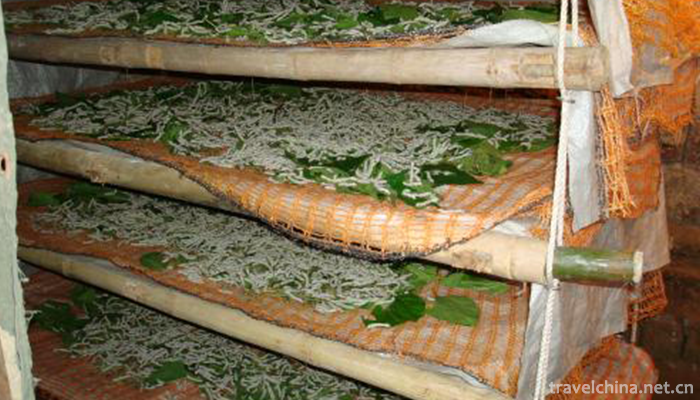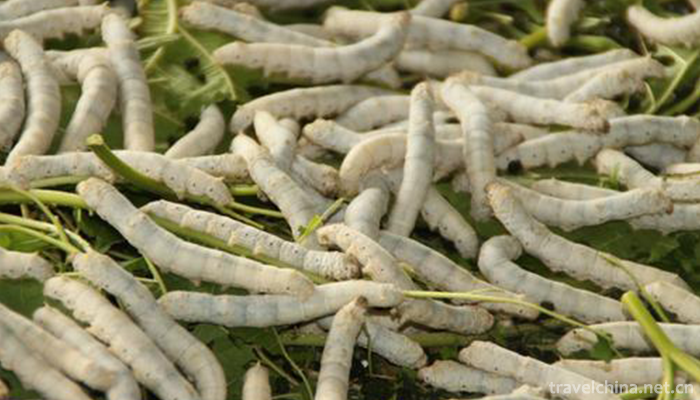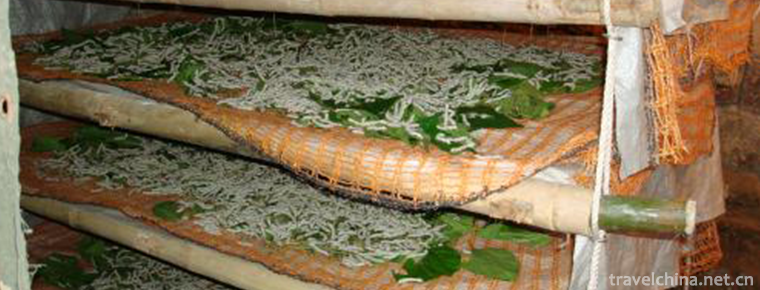Silkworm custom
Silkworm custom
Haining Silkworm and Mulberry Customs and Customs
Haining City, the ancient name is meaningful, and later because of drunken plum from wood changed its name to salted plum. This is the seat of Changshui County in the Spring and Autumn Period and the Warring States Period. It has a long history of more than 2500 years. It is one of the main silk producing areas in the south of the Yangtze River.
China was the first country to breed mulberry, raise silkworm and utilize silk. In ancient history, there was a legend that Fuxi "changed silkworm" and his ancestor "educated people to raise silkworm", and that Xiling, the concubine of Emperor Huang, was the "first silkworm", that is, the earliest silkworm breeder. There are also records in the book "Sou Shen Ji" 350 "Female Silkworm" written by Ganbao (283-351), a salt official of the Eastern Jin Dynasty (now Haining, Zhejiang Province). In ancient times, silkworms were transformed into horseskin wrapped by women, which is the oldest myth about silkworm in China. However, in the civil society, it is not the case. In many areas of Hangjiahu Silkworm Township, people were not impressed by the ancestors, nor did they pay much attention to the sacrifices of the ancestors to the emperors and officials of the past dynasties. The silkworm God who is fond of talking about in Haining Silkworm Township is Niang Xishi. According to Zhang Wangxing (born in 1925), Zhu Renrong (born in 1928) and Prince Kang (born in 1931) of Jinshuiqiao, Dingqiao Township, Haining City, Yangyuan Village, Yiqiao Township, the old silkworm farmers recall that "for thousands of years, cultivating mulberry and raising silkworms has been the main industry of Alahainen farmers. The old saying goes:"Rice cooked for one year, silkworm cooked for one year".
They also said, "Before the War of Resistance Against Japan (1937), the elders said that the earliest silkworm raising in Ala was handed down by Niang Xishi more than 2,000 years ago. In that year, Goujian, king of Yue, in order to restore national shame, devoted Xishi, a beautiful woman, to the king of Wu in order to confuse the government. Before Xishi went to Wu, Dr. Fan Li accompanied Xishi to Xuli to learn Wu dialect and learn etiquette. Fan Li and Xishi passed on the farming of mulberry and silkworm to the people here. Therefore, there are many places in Haining, Haiyan, Tongxiang, etc. At that time, Niang Xishiniang was named Carmine Hui, Carmine Bang, Carmine Port, Carmine Longwan, Carmine Bay or Xiziqiao, Xishiwan and Xishijie Foot Beach because she taught mulberry breeding and silkworm rearing. Yila lives in Tucheng at the foot of the dock (commonly known as Fanliwu), which is now Yiqiao Tiebei Socks Park in Haining City). Every Tomb-sweeping Day, Niang Xishi, accompanied by her village aunts, goes to Dengyun Bridge in the Lotus Reservoir Pool of Dongshan Mountain to make silkworm eggs. On this day, hundreds of male and female silkworm farmers from all over the country will come to collect silkworm eggs. Niang Xishi first let everyone wash away the dirt in the lotus pond, called "eliminating silkworm flower hands". Then she began to produce silkworm seeds, one for each, and then let the villagers arrange silkworm flowers and send silkworm cats to everyone.
"Silkworm flower is a kind of flower tied with colored paper. Silkworm mothers insert on their heads and look charming and graceful; young men tie in front of their bosoms, showing more elegance and style. When they take them home, they take the silkworm flowers apart and paste them on silkworm tools. It is expected that they will have 24 cents of silkworm flowers.
Silkworm cat is a kind of folk handicraft. The silkworm cat carved and printed in peach wood can stick it in the silkworm house to control mice and avoid evil.
"After the Qin and Han Dynasties, people deified Niang Xishi and built a"Yansheng Miao Mental Court"(Xishi Temple) beside the lotus pond, and worshipped Xishi as"the God of protection of silkworm flowers". Every Tomb-sweeping Day, silkworm farmers from four villages and hundreds of miles come here to burn incense and pray for the prosperity of silkworms. Girls who send silkworm flowers originally came from the foot of the dock. Later, girls around Dongshan followed suit in making silkworm flowers and selling silkworm flowers. On this day, the mountains and mountains, the sea of people, called'Rolling Silkworm Flowers'. The vendors, tea shops, wine shops and pastry snacks from all over the country have also come here to set up markets, as well as circuses, juggling, magic tricks and peepers. There is a stage for thousands of years on the hillside. At that time, the local gentry and businessmen will invite the famous actors of Jingkun and Huiban. They will be called "Silkworm Flower Opera" because of their good performances.
Xu Ying, a poetess of the Ming Dynasty, has a poem entitled "Dongshan Fragrant City" in her Poetry Notes of Ruicui.
Competition, courtesy, kindness and friendliness, draw a pool all over the mountain.
Buddha incense treasure candles are sold on board to pray for silkworms regardless of money.
Mulberry production has many folk customs, passed down from generation to generation, followed by custom, has become a very valuable intangible cultural heritage.
In the sound of firecrackers, except for the old age, at the beginning of the new year, the first thing is to "Zhai Buddha", please "Silkworm Flower Five Saints". The first wish of silkworm farmers is to pray for "twenty-four cents of silkworm flowers" this year.
On the ninth day of the first lunar month, it is the birthday of silkworm babies. According to the Record of Haining Prefecture, "It is sunny on this day, and silkworms are expected to ripen in spring."
On the twelfth day of the first lunar month, the field silkworms were illuminated with torches to control insects and pests so as to make the field silkworms flourish this year.
On the eighth day of February, Huanggang Rolling Taiping, also known as Rolling Silkworm Flowers, in Huanggang Town in the eastern part of Haining, businessmen and tourists gathered, and the flow of people was like the spring tide of the Qianjiang River. From four villages and towns, a hundred miles to Huanggang, you rushed me and rolled me. It is said that as long as you rolled out a sweat, you could expect to get "flourishing silkworm fields and prosperous industries". Hip-hop, immersed in a sea of joy, a number of corrugated green crowded in the crowd, to see dressed up in fashion, beautiful Ah Wei and girls, the bone lighter, hands are not stable, here touch, there pinch, but now they do not avoid, nor curse, because, since it is called "rolling silkworm flowers", rolling around, always a little collision. Others say that this is called "touching silkworm flower milk", let people touch, go back this year will be able to "silkworm flower 24 minutes"!
Silkworm farmers can take advantage of this to purchase silkworm tools (silkworm racks, plaques, baskets, baskets, curtains, baskets and mulberry scissors, mulberry leaf knives and mulberry seedlings) to prepare for silkworm events. In addition, there are also the customs of Yuan Hua on the fifth day of February, Huangwan on the eighth day of February, and the skew bridge on the Qingming day, but the scale is not as grand as here.
In April, for the Silkworm Month, silkworm farmers closed doors and windows, neighbors suspended exchanges, and the government suspended litigation, which is called "busy silkworm release".
On December 12, according to the Haining Chronicle, silkworm rearing families, each with salt brine, eggplant ash fumigation and rubbing (pickling) silkworm seeds, hiding in the husk (chaff), to the 24th, a little rinse with clean water, hanging in the shade of the back to dry; in the next year's grain rainy season, can promote green hatching. It is said that the silkworm babies hatched in this way will be disease-free and disaster-free, and will produce large and strong cocoons.
There are many silkworm customs. There are the following briefly:
Silkworm flower
According to the Records of Haining Prefecture, in February Spring Club, around the Spring Equinox, people prepared money for the sacrifice. Mr. Sangzi (Mr. vulgarly burning paper, mostly poor scholar) was invited to hold the ritual of goddess, mostly at the farmers'homes. The ceremony was presided over by Mr. Sangzi. In the whole ceremony, Mr. Sangzi handed over a scale, a red silk handkerchief, a silkworm seed, a silkworm flower and two silkworm flowers to the hostess of the host of the current club, and chanted the silkworm flower song. The mouth sings: "Satisfactory, more than a year; silkworm horse, silkworm paper, head silkworm momentum, two years momentum, good momentum; good cocoon, good silk, good silver, build several new houses..." The hostess respectfully collects silkworm gods and silkworm eggs and calls them "catching silkworm flowers". In order to regulate the atmosphere, Mr. Sangzi improvised short stories about Sangzi's anecdotes and entertainments, such as "Braid Cutting", "Peishi Scenery", "Yanguantou Rebellion", "Catching Robbers", "Down with Chilaos", "Advising Gambling", "Looking at the Current Situation" and other criticisms, which entertained both gods and people. After the sacrificial ceremony of "catching silkworm flowers", the host family sent silkworm flowers and other things to the outside of the gate and sent them back to heaven by incineration. In some villages, when the kitchen was delivered on December 23, it was burned together with the kitchen god. Some places also have the custom of Ying Zigu. In the Southern Dynasty, Liang Zongmu's Jingchu Sui Shi Ji recorded: "On the fifteenth day of the first lunar month, his evening greets Zigu to divine the future sericulture." This custom is most popular in the Hangjiahu area of Jiangsu and Zhejiang, where sericulture is developed.



-
1.Yin and yang
There are three characteristics of yin yang philosophy: unity, opposition and interaction. In thinking, it is an inseparable node of arithmetic and divination.
Time 2018-11-13 -
2.Genghis khan mausoleum tourist area
Genghis khan mausoleum tourist area, also known as Chengling Tourist Area, commonly known as the Eastern Union Scenic Area (not Genghis Khanling)
Time 2018-12-01 -
3.Dayan Pagoda Datang Furong Garden Scenic Area
The Furong Garden of the Tang Dynasty is located in Qujiang Development Zone in the south of Xi'an City, Shaanxi Province, on the southeast side of the Big Wild Goose Pagoda.
Time 2018-12-12 -
4.Tanggu Dagukou Battery Site Museum
Dagukou Battery Site Museum is located on both sides of the Haihe River estuary in the southeast of Tanggu, Tianjin Binhai New Area. It is a national education and youth education
Time 2019-02-13 -
5.Wuzhizhou Island Scenic Area
Wuzhizhou Island is situated in Haitangwan Bay in the north of Sanya City. It is opposite to Monkey Island in the South and is adjacent to Yalong Bay
Time 2019-02-24 -
6.Yalu River Scenic Spot
Yalu River Scenic Spot is located in Dandong City in the middle and lower reaches of Yalu River. It is 210 kilometers long from Hunjiang Estuary in the East and from Dadong Port in the west
Time 2019-02-27 -
7.High bar technology
High-pole boat acrobatics is a traditional folk acrobatics project which simulates silkworm babies'silk spinning as cocoon action performed at the sacrificial ceremony of Silkworm God in Zhejiang Prov
Time 2019-04-30 -
8.Brush making skills
Brush making skills, local folk traditional skills in Huangpu District of Shanghai and Jiangdu District of Yangzhou City of Jiangsu Province, one of the national intangible cultural heritage.
Time 2019-05-24 -
9.Making Techniques of Lianshi Paper in Lead Mountain
Lead Mountain Lianshi Paper Making Skills, local traditional handicraft in Jiangxi Province, one of the national intangible cultural heritage.
Time 2019-06-10 -
10.Beach Head Wood Engraving New Year Pictures
Tantou woodcut New Year's picture is the only handmade woodcut watermarking New Year's picture in Hunan Province. It has its own style with strong local characteristics in southern Chu. Tantou Town is
Time 2019-06-18 -
11.Construction Techniques of Traditional Architecture of Xiangshan Band
Xiangshan Gang's traditional architectural construction techniques, local traditional handicraft techniques in Suzhou City, Jiangsu Province, one of the national intangible cultural heritage.
Time 2019-07-03 -
12.Plant resources in Guangan
The forest vegetation in Guang'an City belongs to the vegetation area of evergreen broad-leaved forest and coniferous broad-leaved mixed forest in the middle subtropics. Gymnosperms include Pinaceae, Cupressaceae, Ginkgo biloba and Metasequ
Time 2020-12-19